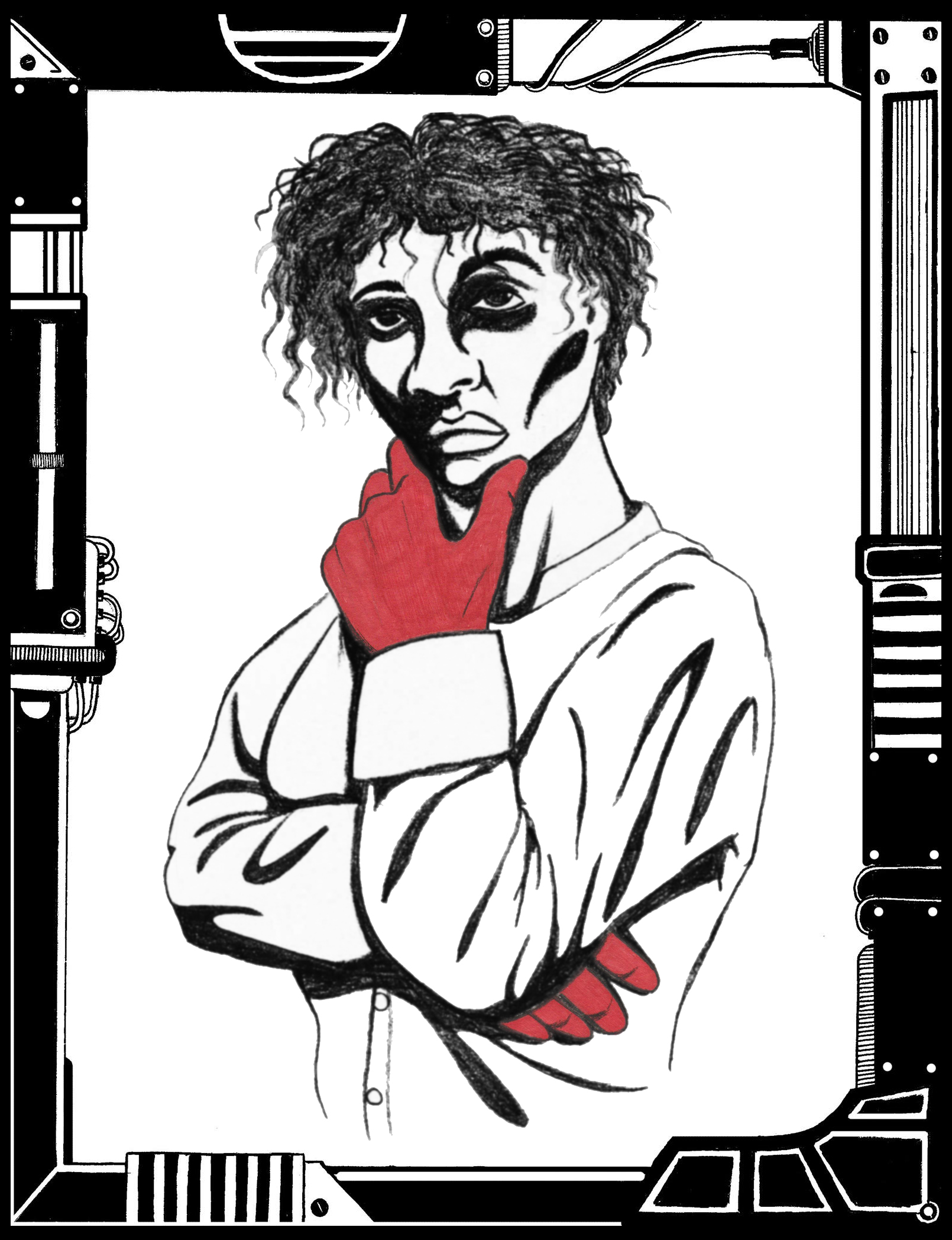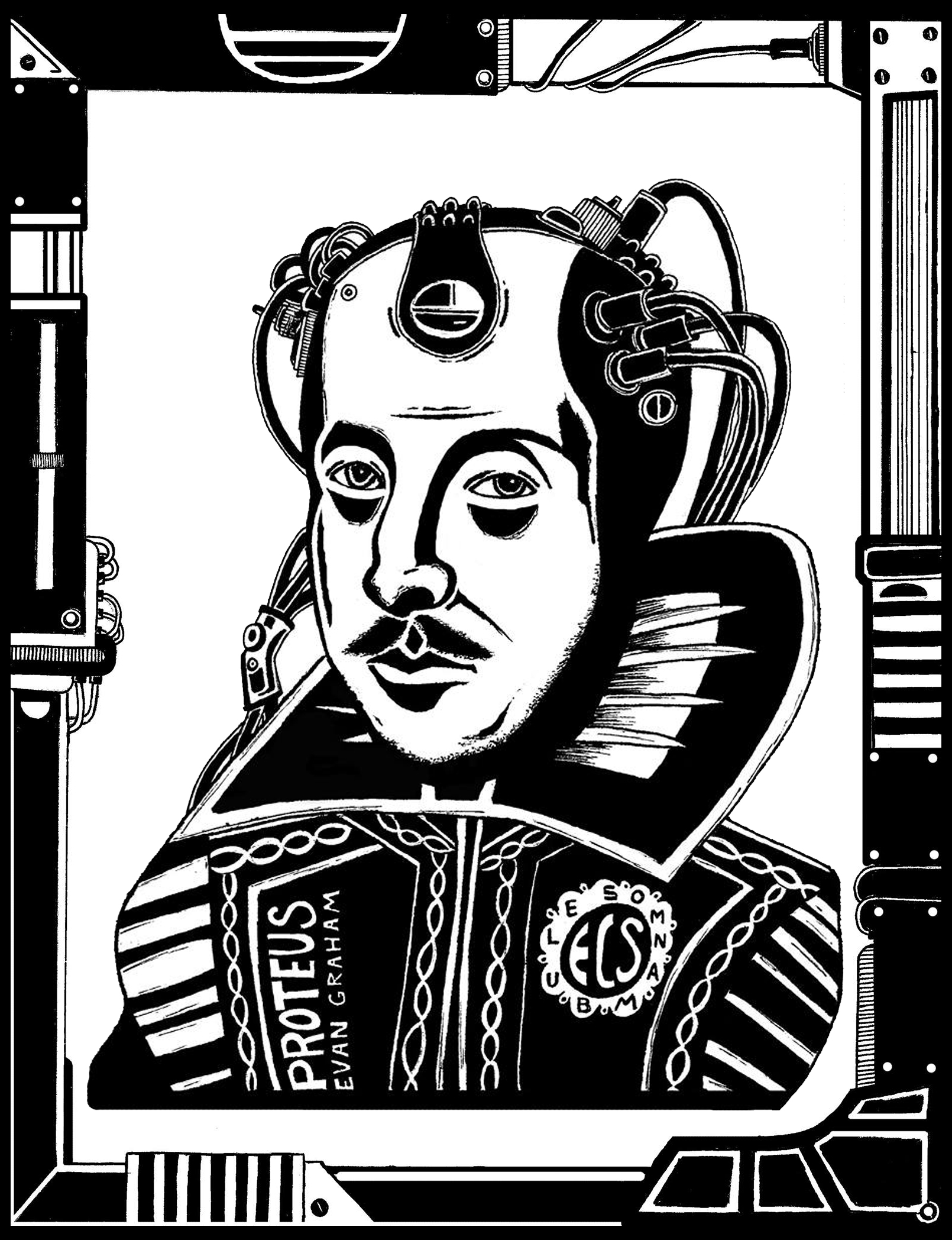Well, folks...this has been a rough week. We were holding on to third place pretty soundly all weekend, until a new dark horse showed up and blasted past us. We’re more or less keeping pace, but it’s been a rough road, and as of right now we’re back down to fourth place, by three pre-orders.
Less than four days are left in this contest, and we need to make every one of them count. People are going to be fighting tooth and claw over that third place position. I plan to get it, but I’m going to need all the help we can rally.
So it’s time to bring out the incentives.
You know the awesome character portraits I’ve been sharing lately? I drew those (except for the Shakespeare one, that was my amazingly talented sister.) In case you missed them, you can check them out here, here, and here, or just look at the new one below. Pretty cool, right? Well, if you like them, you’ll like this incentive:
From now until the end of the contest, anyone who successfully refers a new reader can have a personal portrait drawn by me, for free. I’ll do it in charcoal (like the ones featured so far) or pencil, your choice. I’ll do a portrait of you if you like, or your kid or girlfriend or whatever if you’d rather have that. If you’re a fellow writer who would like to have someone draw a portrait of one of your characters, I’ll happily do that. I’ll draw you as a cyborg, I’ll draw you as an elf, I’ll draw you as a mutant bullfrog if that’s what strikes your fancy. If you want two or three portraits and you can refer two or three people, they’re yours. The only conditions required for eligibility are as follows:
- You must have ordered Proteus.
- You must have referred someone else who successfully ordered Proteus
- You take responsibility for coming to me to ask about getting your reward. You have to opt in for this.
I can’t guarantee a time frame for fulfilling those commissions, other than "by the end of the summer." I’ll start working on them as soon as the contest wraps and do them on a first-come first-served basis.
I can’t promise they’ll be works of art, but I can promise they’ll be works from the heart. I take great pride in my work, just like our ship’s new head scientist, Dr. Elizabeth Marshall.
(Am I killing it with these segues or what?
Elizabeth Marshall
Dr. Elizabeth Marshall was one of the brightest and most promising members of her generation on The Somnambule. A third-generation crewman, Marshall was born and raised by parents who were themselves born and raised on the ship. Like everyone else born during the first 75 years of The Somnambule’s flight, Elizabeth knew her fate and function from birth. From the beginning, her education was keyed toward developing a skillset in her that would fill a necessary role among her crewmates. In her case, early childhood dispositional assessments led to her being trained as a medical specialist
While some children born on The Somnambule rebelled against their pre-determined roles in the ship’s hierarchy, or simply took to them with the smallest possible amount of enthusiasm, Elizabeth fully embraced her assigned profession from the very beginning. Learning about the inner workings of the human body fascinated her. She became especially interested in the field of applied cybernetics, and the various ways in which electronics could be used to improve the functionality of the human body.
Her interests and her dedication to learning quickly made her a favorite pupil of head scientist Marion Krieg, herself a brilliant cyberneticist. She worked closely with Krieg from adolescence to adulthood, and by the time Marshall had finished the ship’s most sophisticated medical education programs, it had become clear that Krieg was grooming her as a successor.
Elizabeth was involved in the development of Krieg’s new quantum cortical implant, though she did not volunteer to be implanted with one. Krieg claimed the implant could give its user the ability to view future events, and while Elizabeth did not actually believe this to be possible, she did believe the implant had the potential to significantly improve its user’s mental sharpness and processing speed. The first human test subjects made a compelling case for Krieg’s claims, but Elizabeth remained skeptical that they could actually see the future.
That is, until Krieg claimed to have perfected the implant. Wishing to be implanted with the new device herself, Krieg was unwilling to entrust the delicate operation with anyone but Marshall. Reluctantly, Dr. Marshal agreed, and implanted the new quantum computer into Krieg’s brain.
Immediately upon completion of the procedure, Krieg’s demeanor changed. She claimed to have seen terrible things in the mission’s future; a horrific cataclysm at journey’s end. She tried to convince the crew that the mission must be aborted at all costs, and began amassing a significant following among the crew.
When Krieg attempted to convince Marshall to join her resistance faction, Marshal refused. As much as she’d respected Krieg most of her life, she believed the woman had begun to finally grow senile in her old age, and suspected that something may have gone wrong with her operation. Beyond that, Marshall held on to the values that had been instilled in her as a child; her greatest calling in life was to preserve the mission and the lives of the colonists the ship carried. She would not play a part in mutiny.
Mutiny came, nonetheless. When Krieg made a play for taking over the ship, Marshall remained loyal to the captain and the ship’s mission. When Krieg’s initial attempt at an uprising failed and her rebels were pushed back to the lower decks, Marshall took Krieg’s place as the ship’s head scientist.
Krieg’s rebellion against The Somnambule’s mission felt like a personal betrayal to Marshall. The woman she’d looked up to as a mentor her entire life had betrayed the most important purpose any member of the crew could have. As heartbroken as Marshal was about Krieg’s uprising, she was determined to put all her skills to work in preserving the mission, the precious lives of the ship’s colonists, and the final defeat of Krieg’s insurrection.












 (Curious Iguana in Frederick, Md., sharing a table with the likes of The Underground Railroad)
(Curious Iguana in Frederick, Md., sharing a table with the likes of The Underground Railroad) (The Skokie, Ill., Barnes and Noble, which also happens to be the place I bought my first copies of The Writer’s Market and The Artist’s & Graphic Designer’s Market many many years ago)
(The Skokie, Ill., Barnes and Noble, which also happens to be the place I bought my first copies of The Writer’s Market and The Artist’s & Graphic Designer’s Market many many years ago)


